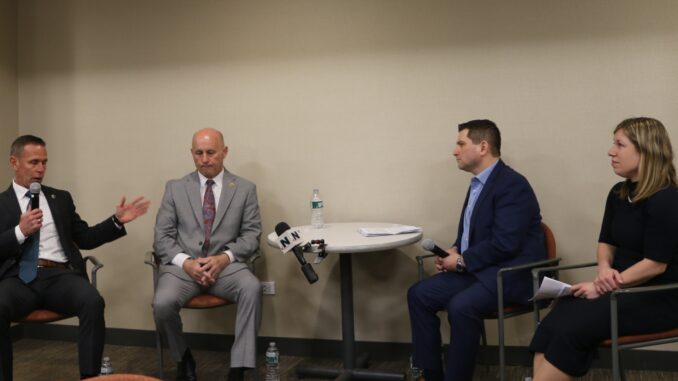
Commissioners Speak to Long Island Association on Crime, Discovery, Bail Reform
By Hank Russell
The Long Island Association hosted a special event in Melville on April 2 with Long Island’s two top cops to discuss the successes and challenges in fighting crime in the region.
Suffolk County Police Commissioner Kevin Catalina and Nassau County Police Commissioner Patrick Ryder spoke on the topic of “Public Safety and Our Economy” during a symposium moderated by LIA’s President and CEO, Matt Cohen.
“In order to have a thriving community, you need a safe community,” Cohen said. “Nobody wants to run a business where there’s rampant crime and nobody wants to work in a place where crime is rampant.”
Catalina and Ryder were asked about working with their respective county executives. Catalina said he “truly loves” Ed Romaine’s leadership. “He is a consummate professional. He lets people do the job they’re supposed to do. … It’s very much a shift from the previous administration.”
Ryder called Bruce Blakeman “the most engaged person” he has worked with. “I get up at 5 a.m. and I start texting him at 5:30 a.m. [Soon,] he texts me back.” He also mentioned that Blakeman can be “demanding,” but “we have to meet those demands.”
But it’s not just the county executive that backs the officers. “All 19 legislators, they all support law enforcement,” said Ryder, with County Legislator Seth I. Koslow (D-Merrick) in attendance.
“We don’t survive without the support of the community,” Ryder said. “When they talked about defunding the police — ‘take the money out of here, move it here’ — policing is not going away. You can’t get rid of it.”
Both commissioners talked about the drop in crime in their respective counties. “Thankfully, crime is trending down [in Suffolk] and violent crime is also going down,” Catalina said. “That’s good; that allows us to focus our resources on other areas [of crime].”
One of those areas was catalytic converter theft. Suffolk police used members of the Gang Task Force to break up these theft rings. As a result, Catalina said, the number of catalytic converters being stolen went from 10 a month to zero. In addition, the county went three months without a report of a stolen converter.
“People aren’t worried about getting a bullet to the stomach,” Catalina said, “but they are worried about getting their catalytic converter stolen.”
Ryder noted that Nassau was named the safest community in the nation for three of the past five years. In addition, crime went down 20% last year and is now down another 18% so far this year.
One of the topics turned to retail theft. “If you see someone steal, you are victimized,” Catalina said. “Businesses are starting to understand that.”
He said he is working with District Attorney Ray Tierney on a program in which repeat offenders must sign an affidavit that they can no longer enter the store. “They sign an affidavit which tells them, ‘You are no longer welcome in our store,’” Catalina said. “If they try to come in [to the store], they will be arrested.”
“There was a time when petit larceny was not a problem,” Ryder added. “The businesses didn’t want to press charges. … I think now the pendulum has swung back.”
Another topic that has taken front and center was discovery and bail reform. As it stands now, the state budget is being held up due to a fight over changes to the discovery law, as reported in Long Island Life & Politics.
“With bail reform, the experts were not consulted,” Catalina plainly stated. “The judges should be given the discretion to keep people incarcerated. … A rapist should not be walking free because someone [in the prosecutor’s office] forgot to check off a box.”
Ryder had a more pointed opinion. “Bail reform is horrible,” he said. “It destroys communities.”
Under the current discovery law, the prosecution has 14 days to present evidence to the defense, but, Ryder said, “I don’t have 14 days; I only have seven days [so the DA can prepare her case].”
There is also a bill in Albany, Ryder said, that a police officer cannot stop a motorist because of a broken taillight or the tint on the windows is too dark. “There is no such thing [as a routine traffic stop],” he said. “Most cops get killed doing a ‘routine’ traffic stop. … The people in Albany got to wake up.”

